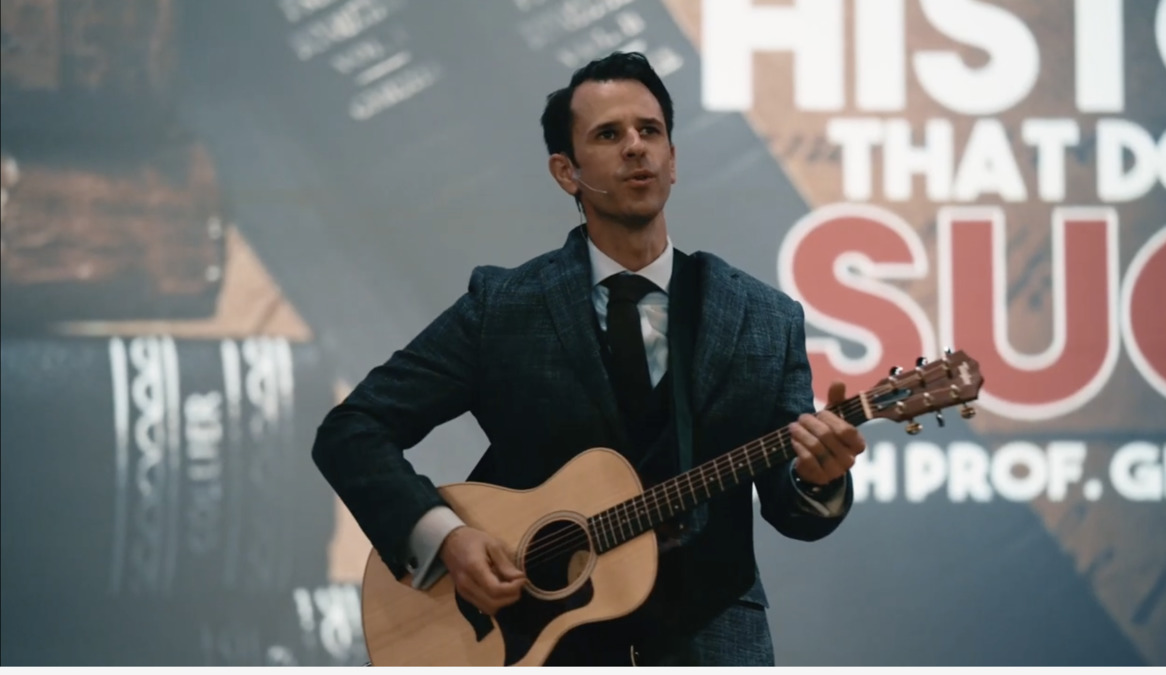When the lights dimmed in the small Tennessee theater, a new chapter of UVU Professor Greg Jackson’s career was about to begin.

When the lights dimmed in the small Tennessee theater, a new chapter of UVU Professor Greg Jackson’s career was about to begin. The Bartlett showing of History That Doesn’t Suck, “The Unlikely Union,” was meant as a “proof of performance.” It would answer questions about the stage show's viability. Performances in New York City and theaters nationwide have since removed all doubt, but at that moment, Jackson admits to experiencing stage fright.
“My heart was about pounding outside my chest, and I was thinking, Greg, this is a small crowd. It’s a few hundred people; jeez, that’s how many people download my podcast in a matter of minutes at any time of the day. I reach millions with my podcast. But it’s different.”
“Then, I’m telling myself, hey, this is just like the classroom, but it isn’t. I had some memorized monologs. I wanted to get right what I had prepared and wanted to be able to walk away from the podium when I intended to, and I hadn’t played my guitar for a crowd in 20 years- I mean not since my glory days of growing up in LA and playing in an early 2000’s punk rock band-and you know we typically played in dive bars for half inebriated small crowds anyhow.”
Jackson said the show, which is playing at The Noorda November 10-11, shares common elements with his classroom experience (Jackson is a Core Faculty in Integrated Studies at UVU). He says it also shares commonalities with his podcast by the same name (currently ranked 16th in the nation) but is entirely different because of the engaging features unavailable in either.
“The show, of course, involves so much time, energy, and production value, even, I mean, just the cost of the sound designs and procuring some of the images; you know, it's not that I wouldn’t want to bring the same thing to every lecture at UVU, but because of the infrastructure involved, you just can’t do that. There is a reason this is a stage show; it’s not a keynote.”
In New York City, it became apparent that there was an appetite for the unique show. “We were off off-Broadway in a small little theater, a fantastic joint, nonetheless, the Triad.”
It was strategically positioned just down the street from where the Association of Performing Arts Professionals (APAP) was having its conference. The APAP is well-attended by theater directors from across the nation.
“We invited directors to come, and there were talent agents there as well. That really opened a lot of doors. We did three nights in a row, and those very nights, we had theater directors come up and say, ‘Let’s book. Let's do this,’” Jackson said.
Jackson also found an agent through that experience, and now he is performing on tour in cities in one to two locations a month, playing to packed theaters with audiences of 500-1000.
“I do a show, fly home, am a dad to my three kids, am a professor at UVU, and crank out more podcast episodes. I work on my books, then two weekends later, I am back on a plane off to the next city and state. That’s kind of the pace booked out through April.”
Jackson says the show is 95 percent the same as when he stepped on the stage in Bartlett, Tennessee, but he’s refined the visual elements and homed in on what humor plays well. “A number of jokes that weren’t in the first version are there now.”
He says he’s excited to bring the show to a hometown crowd at The Noorda.
“They have seen it start from some little idea I had in my basement to when it became a national thing. So, it’s really going to be, I think, quite fun to bring the show home and show everyone what it has grown up to become. I’m looking forward to that.”
The takeaway he hopes to deliver at The Noorda is two-fold. For Utah Valley University students, he said it’s “to see that you can carve a unique and different path in life. And I think that sometimes our students might think that the highest attainments in the field are not open to them, and that is just not true. My experience is that if you put yourself out there, you give 100 percent, people will take notice, and people in your field will take notice, so stay scrappy, Wolverines.”
And, for the rest of his audience, Jackson said it’s the same message he hopes resonates with audiences everywhere. “It is never to overlook the warts of our history but to realize that all of the things we are concerned about in the present — they are just not as unique as we think they are — the sky is not falling half as much as we think it is, because, frankly, the sky has fallen far harder and faster on previous generations. I think that my show, The Unlikely Union, evokes just how lucky we are that this thing came together and has stuck together for as long as it has for well over two centuries. I would love for our students to take heart and realize that when they see an article on their newsfeeds or social media, you name it, perhaps the hyperbole that this is the worst election ever, or there’s never been more disagreement, that it is just that, it’s hyperbole. We can do better.”